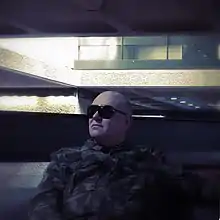Mark White (British musician)
Mark Andrew White (born 1 April 1961) is an English singer, songwriter, composer, musician and record producer.
Mark White | |
|---|---|
 White in 2016 | |
| Background information | |
| Birth name | Mark Andrew White |
| Born | 1 April 1961 Sheffield, England |
| Genres | |
| Occupation(s) |
|
| Instrument(s) |
|
| Years active |
|
| Labels | |
| Member of | Vice Versa |
| Formerly of | ABC |
Born in Sheffield, England, White first entered the music industry in the late 1970s as lead vocalist and keyboardist of the electronic band Vice Versa. After releasing one studio album with the band in 1980, Vice Versa member Martin Fry emerged as lead vocalist and the band opted to transform into a new band called ABC. White resigned himself to composing ABC's music while also playing guitar and keyboards before retiring from the music industry a year after the release of their sixth studio album, Abracadabra (1991). As ABC's keyboardist he used a variety of instruments, including the E-mu Emulator, the Yamaha DX7 and the Fairlight CMI.
In 2014, White came out of retirement to reform Vice Versa with Stephen Singleton.
Music career
In the late 1970s, White was a member of ABC's predecessor band, the three-piece electronic band Vice Versa. Other members of the trio were David Sydenham and future ABC saxophonist Stephen Singleton. After being interviewed by future ABC lead vocalist Martin Fry for his fanzine, Modern Drugs, the band members invited Fry to join the band as a keyboardist, and Vice Versa later evolved into ABC.[4]
With Fry in place as lead vocalist and songwriter, Vice Versa changed its name to ABC and changed its sound to a contemporary pop style that at that time led them to be categorised with bands like Duran Duran, Spandau Ballet and the Human League. Between 1982 and 1991, ABC recorded six studio albums, The Lexicon of Love (1982), Beauty Stab (1983), How to Be a ... Zillionaire! (1985), Alphabet City (1987), Up (1989) and Abracadabra (1991), and released a greatest hits compilation album, Absolutely (1990). Together with Fry, White co-wrote and produced a couple of songs on Paul Rutherford's sole solo studio album Oh World (1989), including the single "Get Real". During this time, the band went through numerous personnel changes, with White and Fry being its only permanent members.[5]
Later years
ABC disbanded in 1992, with White retiring from the music industry to pursue an interest in reiki therapy. ABC reformed in 1997 without White, and Fry continued to tour under the band's name despite being its only official member. White declined to participate in VH1's Bands Reunited in 2004, when attempts were made to reform ABC for a one-off performance.
In 2014, White, together with Singleton, compiled the Vice Versa box set, Electrogenesis 1978–1980 which was released on VOD Records.[6] This led to White coming out of retirement to reform the band. In December 2015, the duo released a Christmas single called "Little Drum Machine Boy", which was available to download for free on SoundCloud. They are currently writing and recording new material.
Discography
With Vice Versa
| Year | Album |
|---|---|
| 1980 | 8 Aspects Of |
| 2014 | Electrogenesis 1978–1980 |
With ABC
| Year | Album |
|---|---|
| 1982 | The Lexicon of Love |
| 1983 | Beauty Stab |
| 1985 | How to Be a ... Zillionaire! |
| 1987 | Alphabet City |
| 1989 | Up |
| 1991 | Abracadabra |
References
- Erlewine, Stephen Thomas. "ABC – Artist Biography". AllMusic. All Media Network. Retrieved 2 August 2016.
- Soto, Alfred (22 February 2007). "Sophisti-Pop". Stylus Magazine. Retrieved 28 February 2017.
- "Alphabet City - ABC". AllMusic. Retrieved 28 February 2017.
- "Vice Versa (4)". Discogs. Retrieved 10 October 2009.
- Erlewine, Stephen Thomas. "ABC Biography". AllMusic. Retrieved 30 March 2017.
- "Sale for the VOD132-Series and VOD116 starts early November". VOD Records Germany.
External links
- Mark White at AllMusic
- Mark White discography at Discogs
- Mark White at IMDb
- Mark White at AOL Music at the Wayback Machine (archived 20 February 2009)
- Electricity Club interview 2015 at the Wayback Machine (archived 9 May 2016)